
>> 7. Epidemics and Disinfected Mail
was a logical source of smallpox. Tsar Nicholas I (1825—55) decided to take advantage of the French Revolution, and in 1830, planned a campaign against France and Belgium. What better way to fight the war than with Polish troops, but most of the Polish ensigns banded together to begin the November Insurrection in 1830. The Sejm (Congress) declared war on Russia, which lasted until September 1831. The results were again disastrous for Poland, who lost 6.000 leaders in forced exile, as well as thousands of soldiers in the 23 battles and thousands of civilians in the epidemic. Frederic Chopin (1810-49) was disturbed by the news from his homeland and, after being dissuaded by his family from joining the fighting, went from Vienna to Paris. Here his patriotism evolved into writing the Revolutionary Etude and the Scherzo in B Minor.
To prevent the spread of cholera the postal authorities began to puncture the envelopes. The Royal Prussian Government on 4 May 1831 issued an edict stating that all mail was to be punctured with needles, dipped into vinegar and fumigated in special boxes. These boxes had a tight cover with a tiny vent, a mid section containing a vinegar pan, and the lowest section with a crucible of glowing charcoal, topped by a sprinkling of sulfur, saltpeter and bran. Letters were then cooked for five minutes, removed, checked and perforated or slit if still suspected of contamination, and fumigated again.
The above illustration shows the rastel used in perforating. Below are enlargements of perforations in a Danzig letter:
Danzig Report Nr. 60 - July - August - September - 1988, Page 11.
Hits: 1571
Added: 26/06/2015
Copyright: 2024 Danzig.org

